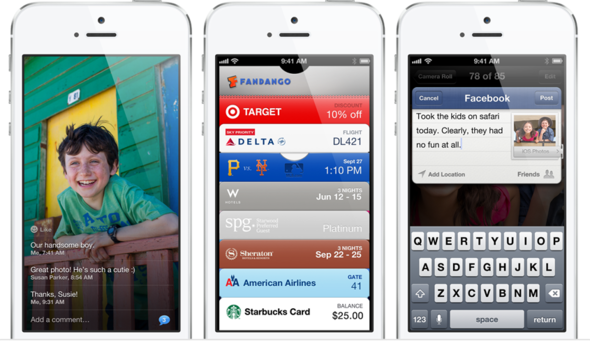Netbooks Hang Strong In Classrooms
Netbooks will continue to lead tablets and laptops in education sales this year, predicts ABI Research.


Six Ways The iPhone 5 and iOS 6 Amp Up Social Opportunities (click image for larger view and for slideshow)
The education market remains a stronghold for netbooks, according to a recent report by ABI Research. InformationWeek Education interviewed ABI analyst Joshua Flood by email about this phenomenon.
InformationWeek: ABI found that netbooks continue to sell well in education markets. How well are they selling? What are the top five device types you track in the education market, by share?
Joshua Flood: Netbook shipments in the education market are projected to increase from 5.5 million in 2012 to 5.7 million in 2013, a 4% increase year-on-year. We only covered netbooks, media tablets [such as the iPad] and laptops in the report. By comparison, the numbers for media tablets and laptops in education are expected to increase a bigger percent in 2013 -- but they will still lag behind netbooks.
IW: How are you defining the education market?
Flood: Computing device shipments are only through education channel sales and do not include consumer purchases of products intended for the use in classrooms.
IW: You note that many of the largest vendors no longer sell netbooks. What significant vendors are left?
Flood: OLPC (One Laptop Per Child), Intel/Lenovo, PC Classmate CTL are the major ones. There are a few smaller vendors also dedicated to the education market. An example of a tablet vendor purely focused on education is LearnPad (Avantis Systems).
IW: Will the reduction in competition affect netbook pricing? What about potential innovations?
Flood: I don't believe the reduction of pricing will have a major effect on netbook pricing. Organizations like OLPC and Intel's education computing program are based more upon achieving the objective of higher shipments, and increasing prices because there are [fewer] competitors doesn't really work with their aim.

An example of OLPC's latest XO-4.0 netbook, I believe the non-touch version, is approximately $190 and the touch version is $210. I believe the potential innovation will occur in how these companies/organizations develop their netbook solutions over the coming years and begin developing media tablets.
IW: Why do netbooks continue to be successful in education markets?
Flood: The affordability and potential use of computing devices has enhanced learning in several ways:
-- Students can access learning material relevant to their level of knowledge and understanding.
-- Learners can work through relevant material and modules at their own pace with little supervision. Previously, everyone had to keep pace with the teacher and some children could fall behind or lose track, leading to distraction and wasted time.

-- Children in disadvantaged communities and regions previously unable to afford computing devices now have a chance to develop their computer skills.
-- Class sizes can be much larger as children are focused on their own learning targets. The U.K. education authority recently introduced academies with advanced ICT capabilities with an abundance of computing devices and it is not unheard of for some core subject classes to have in excess of 90 pupils in one room.
-- Different learning styles can be incorporated into the software and applications to cope with different environments and educational levels.
-- Learners can receive instantaneous feedback, encouraging them to progress and improve.
-- Students can obtain computer skills and knowledge of the Internet that will help throughout their lives and careers.
-- In advanced education, students can reduce travel time and travel costs by studying off site or remotely. As for netbooks over media tablets, a netbook enables children to create content to a greater extent than primarily consuming data. Additionally, no significant scientific data points to a greater benefit with children using a tablet instead of a keyboard. The OLPC has already begun offering a netbook product with touch capabilities.
Netbooks also tend to be a lot easier to repair than media tablets. Concerns have also been expressed regarding battery charges. Media tablets are usually good for approximately 500 to 600 recharges; once the battery has gone, it is unheard of to purchase a replacement battery, which is not the case for netbooks.
IW: Is the continued use of netbooks primarily due to long-term contracts signed by school district IT specialists?
Flood: Yes, however, in some countries it's slightly higher than school district IT specialist. I believe in Latin America, and some countries in Africa it is virtually at the federal government level. Contracts usually range from 12-36 months.
IW: Is the netbook phenomenon of more impact in certain geographies and demographics?
Flood: Within the education sector, the biggest regions/markets for netbooks is Asia-Pacific and Latin America, respectively. We project Asia-Pacific will remain flat at about 1.6 million units shipped in 2013, and Latin America will see an increase from 1 million units in 2012 to 1.3 million units. North America will dip from 900,000 to 800,00 units. For age ranges in education, netbooks currently are used most by children ages 12 to 16.
IW: You note that netbooks hold inherent advantages for education markets in size, price and flexibility. Nonetheless, you see them fading away and replaced by tablets. Why?
Flood: We do not project netbooks to fade away completely. There will still be a netbook market in excess of one million devices per annum in five years' time. However, we believe there will be a bigger shift to tablets and other laptops. It may become the case that the tablet form factor mutates as we're currently observing with ultrabooks [into] convertibles and detachables.
Media tablets offer several advantages over laptop and netbook devices: -- Usually smaller (no larger than 10 inches) and lighter, making it easy for children to handle.
-- The compact designs enable easy storage in limited spaces like elementary and primary schools.
-- Better battery life than netbooks and laptops—usually a netbook/laptop with good battery life is substantially heavier than a tablet.
-- Tablet OEMs have begun developing extensive software, applications, and, in some cases, a unique content ecosystem for tablet devices, which can enhance children's learning.
IW: How long will it take for tablets to become a primary device in education?
Flood: I believe the turning point will be around 2014.
IW: How do you think the shift to tablets will affect the education market? Will it change content delivery?
Flood: As content creation is limited on a pure tablet device, the OS will need to be highly customized and this is probably going to be a closed system, as with iOS or LearnPad. However, it is also likely we will see mutations of tablets with keyboards in the education sector which could use a Linux operating system and thus content delivery will remain similar.
Can data analysis keep students on track and improve college retention rates? Also in the premiere all-digital Analytics' Big Test issue of InformationWeek Education: Higher education is just as prone to tech-based disruption as other industries. (Free with registration.)
About the Author(s)
You May Also Like
How to Amplify DevOps with DevSecOps
May 22, 2024Generative AI: Use Cases and Risks in 2024
May 29, 2024Smart Service Management
June 4, 2024







